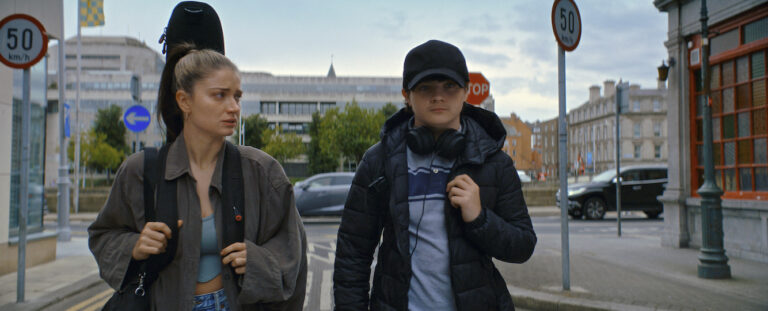
Synopsis : Single mom Flora (Eve Hewson) is at a loss about what to do with her rebellious teenage son, Max (Orén Kinlan). Encouraged by the police to find Max a hobby, Flora tries to occupy him with a beat-up acoustic guitar. With the help of a washed-up LA musician (Joseph Gordon-Levitt), Flora and Max discover the transformative power of music. From the musical mind of John Carney, “Flora and Son” explores the bond between a mother and son on a journey toward a new harmony.
Rating: R (Brief Drug Use|Sexual References|Language Throughout)
Genre: Musical, Comedy, Drama, Music, Romance
Original Language: English
Director: John Carney
Producer: Anthony Bregman, John Carney, Peter Cron, Rebecca O’flanagan, robert Walpole
Writer: John Carney
Release Date (Theaters): Limited
Release Date (Streaming):
Runtime:
Distributor: Apple Original Films
Production Co: Treasure Entertainment, Fís Éireann/Screen, Distressed Films, FilmNation Entertainment, Fifth Season, Likely Story
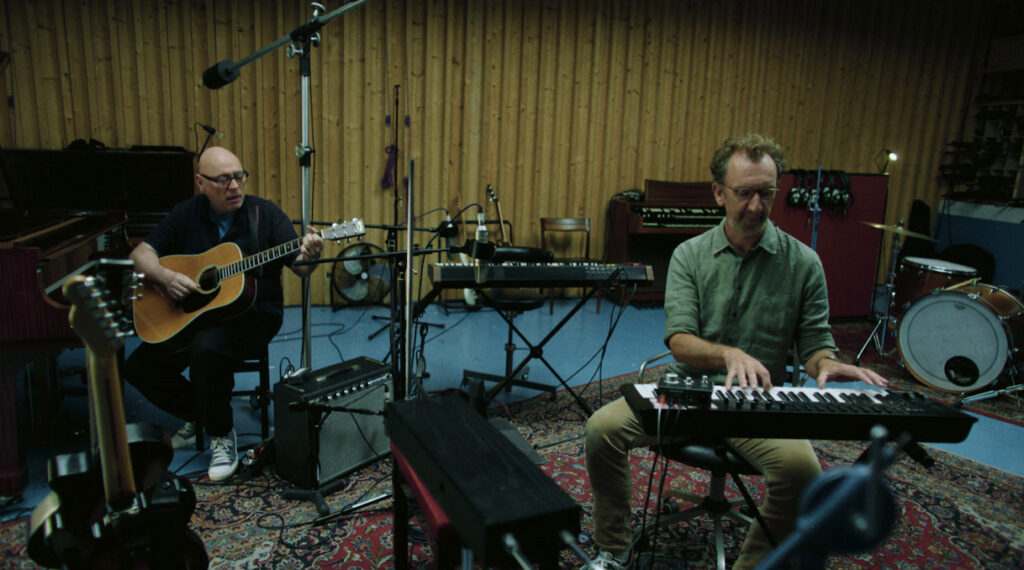
Q&A with Writer/Director John Carney, Songwriter Gary Clark and Producer Anthony Bregman
Q: What was the inspiration for this film?
John Carney: I got my inspiration from my own little story of finding a guitar. With Flora and her son, she opened the laptop and they had their first conversation. I was like, nobody wants to see people on screen, on screen — that’s never going to take off. So I put it away and I went… I can’t remember what I did. I mean, with the pandemic, we started zooming particularly in the film industry. It seemed we just lived our lives on these screens. It went on for a while.
I thought about the 20 pages I had and it only occurred to me very recently, the very stumbling block that I had initially — that nobody’s going to watch people talking on screen — even though we had facetime. They’re not going to relate to it. Suddenly, the very thing that was blocking me was actually my way into the movie and it weirdly makes it more accessible for people because as soon as Flora and Jeff start talking with that piece of glass, we all know how that feels in a way, we were just FaceTime-ing occasionally with our kids because we did 10 of these zooms every day.
We knew the rules after three months. Now obviously zoom is going to be like this writing telephone and zoom and it’s not going anywhere even though the pandemic. Thank God it’s gone. But, that gave me permission to speak to the audience and touch on some subtleties that I didn’t think we would have shared had we not had the zoom thing.
Q: Talking to people on screens has become common to everyone. A lot of people were really hungry for a connection during the pandemic. To be able to combine those two things, like John said, having a way in to actually get to what the story was about — it wasn’t just about people talking on screens. But in a way, this film works differently now than it may have been [if it was made] five years ago.
John Carney: I’ll tell you why. As a filmmaker, it taught me a very interesting lesson, that you can hold something and let it go and you kind of wait until reality catches up to you. It’s weird. Timing is everything obviously with movies. I really learned that with this film because I don’t think I would have made it. I didn’t think it would really make sense to do the Zoom thing. then I was like, “How’s she going to get guitar lessons? If she could do the old school thing of knocking on a door and you open it, but the zoom thing allowed me to make a slightly fantastical thing about love that’s never consummated and a couple that kind of fall for each other to create… That’s not possible like that from a producer’s perspective.
Q: Does that make things easier or harder in terms of having to filter the story through screens?
Anthony Bregman: There’s a few aspects of that. I think one way to answer that question is it makes it easier because it’s something that we already know about. We already have our own experience for this is now not kind of an esoteric weird thing. Oh, there’s Skyping — where only 2% of anybody regularly Skype. This is now something that’s really part of our lives and that we have an association with it. That’s going to be made fresh by this movie by having this relationship between Flora and Jeff where they have real connection over a screen.
Whereas a lot of what we were experiencing was a kind of connection that really isn’t a connection and sometimes it’s the opposite. it gave something to reinvent from a practical sense. It was really hard because shooting with the shooting zoom scenes, you have to have the two rooms next to each other. You have to have the cameras on the actual computer that aren’t the cameras that are actually recording. You have to replace those. You have to have two film crews.
You have to have little earwigs stuck in everybody’s ears so they can actually hear what’s happening. But in each other’s conversations, you have to not, it’s very expensive, complicated. And we ended up building Jeff’s studio in Dublin on a soundstage that had thick soundproofing like that all around it. And we went to LA and shot the background. We found the right house and then shot out the window into this mountain so that you can actually see the leaves of the trees waving and actually have real movement. Then we projected it instead of just green screening it. We put up a huge screen outside the window behind the fake window, inside the soundproof box. Behind the window, was a giant screen that had that background. It was very complicated.
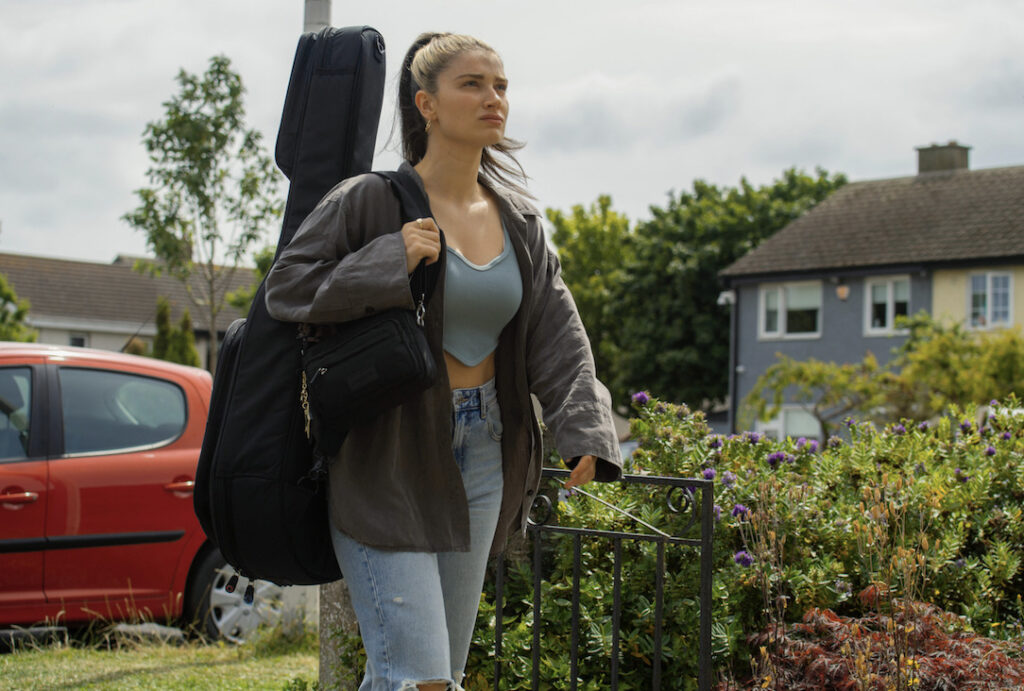
Q: It’s unfortunate that Eve Hewson can’t be here to talk about Flora because, no disrespect to the rest of the cast, this really is her movie. It’s her central performance that’s guiding so much of this storytelling. What were those early discussions with her about Flora?
John Carney: Eve was like the reason I got into this movie. I wanted to try and redeem this character, she has to be out there to begin with. So it was funny in many ways, like I’d be encouraging actors to go outside of their comfort zone. Eve didn’t need any of that — she was already a really interesting person. I still haven’t quite figured out what it was that she had on her mind to play this role. I didn’t know her well, I met her once when she was like 15 through her dad. Then I heard she was an actor and she said she wanted to be an actor.
Then a few years later, we saw her on screen. Then this came up and her agent was like, “Well, just Zoom with her — just speak to her.” I was like, “She’s too beautiful. I see her in Victorian things.” I just clicked on the Zoom and she clicked up with this big smile. She was like, “How are you?” There was this real immediate connection. She was in LA at the time and we found ourselves like two Dubliners chatting away. She was so funny and she basically said to me, “You’ve written a comedy. Whatever you get from anybody else that’ll bring you more millions of dollars or big names or whatever. But I’m really funny. ”
I realized maybe I can get somebody that’s a little bit more like the person I wrote in my head. Maybe she’s a star but I won’t get from this kind of face that she has. She just, maybe is just the face. Her attitude is great. She comes on to it; she doesn’t try to follow in her father’s footsteps in any way except that she’s a bit of a rock star. I mean that in all the best way, I think that’s on screen. She doesn’t just go in and talk about this line or that. It’s like she just had met this character — you know what I mean? I remember us ending with my saying, “You’re going to have to show this,” and she was like, “I’ll show something wonderful about it.” Yeah, she’s amazing in this.
John Carney: About two weeks from shooting — we had taken so long to go through it really quickly once Eve was in. Then we were like, “well, who’s the guy now?” He’s all about various people. Then I got a letter from Joe [Gordon-Levitt] who I didn’t know saying, “I play the guitar and love music.” I was like, “I had this kind of dreamer guy in mind with dusky denim jeans and the house up in the hills, sad and disappointed. I was like, “Joe Gordon, the gorgeous actor, button down and sort of respectable.”
He was like, “No, I don’t have to be that and what I will give you, will be really interesting.” He told me the movie I was making was in a way that I don’t think any other actor has quite done. He was like, “As you say in your script, it’s James Blunt versus Tom Waits. “I’ll give you Tom Waits. But, please, even if you don’t cast me, don’t go the James Blunt way. I’m not a brilliant player, but I’ll give you the Tom Waits thing that you know you’re looking for.” I was like, “That’s convincing.” Then we started talking about myself and Joe’s life, which is that we love music — we’re amateur hobbyist musicians.
We’ve made films, s that’ our main thing. Then he started to say his wife is a singer and he sings every day with her, with his wife. We had these really interesting [conversations] where I was like, “So you harmonize with your partner every day.” I started doing it with Marcel and my wife was in the movies. You guys are friends and that’s you, that’s me. That’s my kid as well. But, in the middle of the round, I’ll tell you this is a tip. You go home with your partner and it’s like, “Oh, well, you came home like you swore you would.” And this was something that myself and Joe were experimenting with.
Q: That’s what the whole movie is about…
Anthony Bregman: Is a song you might get along the timeline.
John Carney: So that’s Joe. Jack Rayner is a friend of mine who I know I have to put in every film. I just love him, he’s so funny. We listen to Steely Dan music in the Green Room together. Before going on the set, we just share these weird things that we agree on. He’s just a gorgeous person, really funny. And then yes, we were two weeks out. No kid and I was terrified and I think we were meeting a lot… I’m going to do an impersonation of when I was a kid.
I was getting a lot of tapes, like really big performances. So I downloaded this thing, an audition, unpressed, unsolicited play on screen — and he didn’t even see where he walked in and saw the guitar. He walked in, hit his spot. What’s that guitar? What’s he doing there? No movement, didn’t move his hand, didn’t move his leg. And this kid [Orén Kinlan], he did that. Walking on. What’s that for? He’s just captivating. I remember ringing Anthony Bregman [my producer] and saying, “If we don’t have this kid, we’re not starting to shoot, we’re really lucky.”
Q: It wasn’t like he was pushing the performance out at you. He was making you lean in, in a way, and that’s kind of what he’s doing here as well.
John Carney: Exactly. He doesn’t try very hard. He’s a gorgeous sensitive kid that is different from this guy, with this really sensitive heart, lovely person. And, yeah, he’s not trying to please adults, which I think is a very important part of being an actor and probably a very important part of being a child actor. “But I’m not just going to try and get your affirmation, I’m just doing this for me.” It’s weird. It’s very interesting.
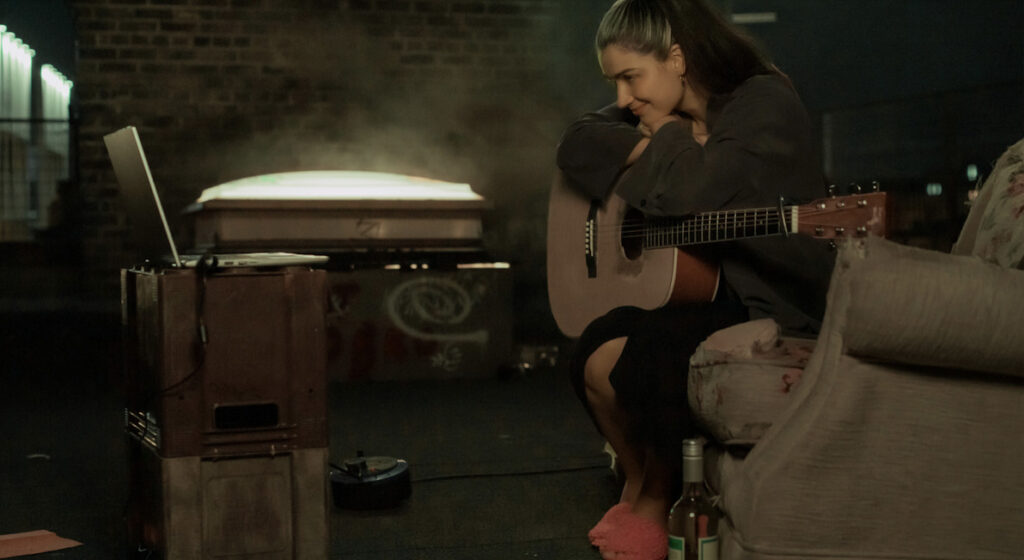
Q: Gary, you worked with John on “Sing Street.” How is this experience — in terms of the collaboration — different from that one? What sort of discussions did you two had when you were trying to figure out what songs these characters will be singing, what kind of songs will help move the story along? You can take any of those songs and pop them out, put them on the radio when they work. But they also have a narrative function here and a character development function as well.
Gary Clark: Yeah — from “Sing Street” to here. The fact there’s a school band in a certain period of time tells you a lot about what it is going to sound like — that’s the big difference with “Sing Street.” Whereas with these characters, we figure out what it did sound like. It started really early on in 2022, in February or March or some time in the summer. John sent me a script with so much information in it. There are little changes but it’s not that different from what you see on screen and the main [characters] are all there. We watched our own Zoom and went through the whole script and talked about what really mapped out the Coroner Spoon songs.
We knew that the song on the rooftop was important and, even as Joe’s character came together, we knew that the highlight of you had a title at the time, but we knew the song in the end was really important. All the threads, all the disparate musical styles, somehow come together there. We knew that Oren’s song when he sings it the first time, when his mom hears him for the first time, which is a John song — we knew that had to happen.
Also John and I were still pinging off one another various ideas all the time. It was a couple of bits of musicals that we had around and then it was a journey to find the sound of those different characters. The big thing that was different is that we brought Eve and Joe into the writing process and studio. Eve actually said to you, that she didn’t think she could hear this and we were like, “Ok.” So instead of us going away and rewriting it and hanging it back we thought… Well, actually John said,”Let’s go into the studio and they were shooting at this time.
It was pretty far down the line. We had to see the rooftop, see where we had to do it a week later. So, we went into the studio in Dublin on the weekends and I remember you in the moment, saying, “Ok, we’re not leaving this room until we have this song in the back.” He just went through what John and I already had and worked through the verses with them. They contributed so much to what their character would say. We had it by the end… I called it by the end of the day.
John Carney: The interesting thing from a film-making point of view is that it was never done out of wanting credit or glory or anything like that because [no one] never changed a line of dialogue of the film. None of them said, “I don’t like that line or my character. “ It struck me, it’s very interesting when it comes to doing a thing inside the acting. They were both super — their attention was really focused and I sympathize with them because I’d fight for a line of dialogue. If an actor was here for a bit, I would ultimately let them have it, but I would fight and if I try to, please let’s shoot it., But when it comes to singing, it’s weird.
It’s different. Like I said, if somebody says, I can’t say please, can we? I felt like if I resist this request and it comes from a good place, it’s not somebody saying I’m looking for a credit. It’s clearly coming from an actor’s place. Just come in, let’s just hash this out, see, change this word, change it up. And Eve, she would say this in this way and that word doesn’t suit me. It taught me a lot in terms of why they weren’t changing the dialogue, but they wanted to change the sort of thing they were doing in the movie four or five times.That’s a huge leap of faith on everybody’s part, not just ours but yours, but it’s mine, the actors aren’t here so I can tell you.
Q: The fact that you were able to like it probably helped that you guys were a little ways in the production when that started happening, right?
John Carney: At that point, you figured out each other’s rhythm, they know the characters, they were gonna have a sense of like, “I think this is how this song should work or this is maybe where we want to take this, that and also, you know, the way anybody in the in the room is made films with actors, they’d be like, all the dialogue is fine. All this is fine. I love the other actors, these classes where they shadow over and you’re like, OK, Jesus, we change. It’s really a specific thing that bugs them that you should change because you want the actors to be comfortable and not try to force that.
Q: Was it always going to be Joni Mitchell’s song “Both Sides Now,” and was it always going to be one shot?
John Carney: I didn’t use that song [at first]. We shot another song. We shot John Martyn [the late, great Scottish songwriter/guitarist] and cleared his song called “I Couldn’t Love You More.” This is a stunning song. It’s a great performance of him doing it and we put it in. We shot it and Eve was amazing — she was brilliant. She actually came up and said, “You know that scene, can we shoot that first in the day? I don’t want to be tired of doing it because it’s really a big scene for me. Can we shout over John Martyn?”
I recommend watching the youtube clip of that song. It’s stunning. She cried perfectly. Moved on next, edited it, put it in the scene, put it in the movie, watched the movie and it comes after the scene where Joe plays with his son in the park and sort of fails. I can see why you’re going to just go home and watch it. She goes home, watches John Martyn when she cries, the film’s dark. I was going, “What? It’s a brilliant song, a beautiful performance.
The film is the next time you see Joe, you’re like, man, you just don’t fancy him anymore. It’s weird and it struck me like the way when you’re making films and you think it’s really deep and complex and then a really basic old fashioned unwritten rule of moviemaking hits you. It’s like the natural order of the way things are, which is — don’t have your lead male character be followed by another guy or God. I’m going to say a guy because it undermines what you’re needing. So the first thing that we were struck with, it’s got to be a female voice.
Across the voice, she sees at the beginning on the reality TV show of the girl winning and being judged. It has to connect with that. Not Joe. Do you know what I mean? So it leaves the Joe character and his journey intact by not seeing a really cool guy, you can’t have somebody else. I’m just trying to think of a good example. You can’t have James Bond and then this other guy who comes in and he is a bit more James Bond. You know what I mean? He’s 007, you can’t have that. You’ve got to stick with it. You’ve got to make that guy attractive then and kill him. No, I love that song. But it’s more about the performance of that, isn’t it — that we like it in a way.
It seems cheeky to put that song, but it’s just the way she sings it, the way she plays the guitar, the way she leaves the song in the front and stands back from it is such a vital lesson for Flora to learn at that stage. Having seen the bigger performance earlier on and the idea of judges and panelists — which I hate — this whole idea of you are awesome, you’re amazing. You have 50 notes and then Jeremy just sat back there and she’s like ah, now we’ve got a genius here.
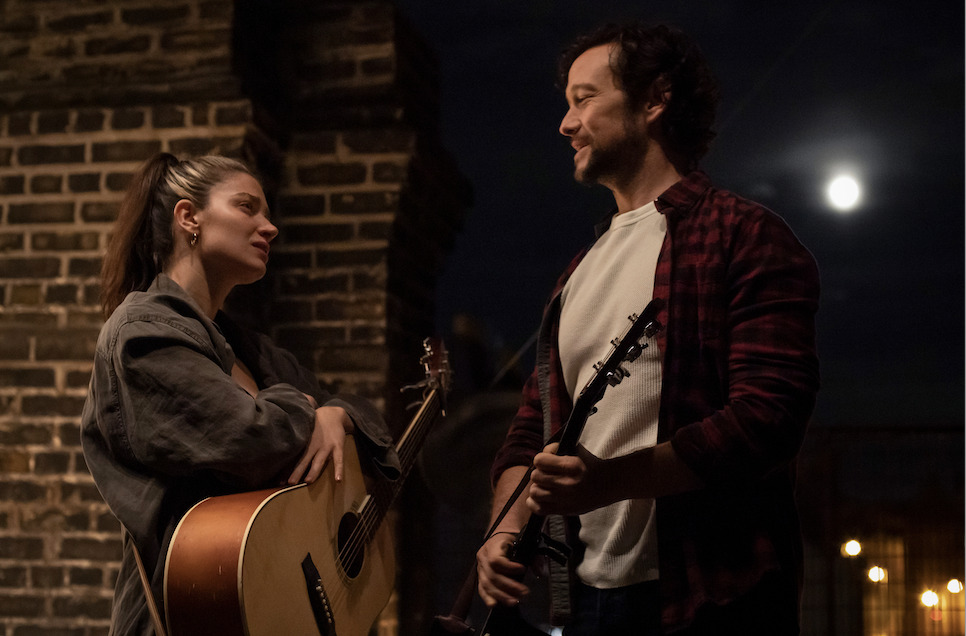
Q: There’s probably a lot of people here who don’t remember the first time that we heard that song and then watching her hear it for the first time and being so moved by it. It’s just such a testament to the power of that Joni Mitchell song. you’ve got a bunch of actors who are at different levels of musical ability, playing characters that are at different levels of music and ability. You’ve got two people playing on a screen and three people playing in a pub, but it’s all got to sound like they’re playing together and actually communicating. you’ve got to direct that so that visually comes together and feels cohesive and that you experience that sense that music is really like virgin gaps and bringing all these people together.
Anthony Bregman: Sure, our budget is infinite should be that we actually had something else that went on in that scene. When we shot the scene, there was a big visual effect that we had in the scene, which is basically she’s at the sink, washing the dishes. And then she turns around and there’s a shot of her listening to the song. As she’s listening, she drops the dishes and then before they hit the ground, they’re in mid-air. And then,they just stand in mid air and she walks over them to the thing and his performance is so strong that John decided that it is the visual effect. She is the special effect and we dropped the dishes. We got rid of that and used some of the money set aside for the visual effects to pay for the set.
John Carney: It was definitely a challenge. But when I’m hearing you say that in my home right now, it’s so simple. It’s too easy now in musical movies to have the best songs sung by the best person, everybody’s going to feel right in their home. But I think musicals are so important and we are really in an interesting time. I tried it a little bit with “Once” and a few of the other movies — but I’m really obsessed with it, which is how can we tell stories about music, using those tools that Judy Garland, Mickey Rooney use in putting on a show — the composition arrangement, getting the band, get all that fun of that. Not just Boy Meets Girl, they triumph, they follow their dreams and are holding a bunch of awards at the end.
That’s the only way we measure music is how successful the characters are at the end. I really hate that. I’m tired of that. I used to love it but I feel like, as a director, to start challenging myself more and finding ways for the music. There’ve been so many episodes of music meaning something to me, but it’s never just meant the lights staying on me playing a song. It’s been something weird. In Ireland, we use music for so many different reasons. Grieving weddings, meets, break ups. It’s not just being on a stage and saying, follow your dream.
I love that challenge of really knowing the stage. People are going to say she’s amazing. They’re going to get us another pin. Ok. It’s a real Irish sing song thing, which I experienced some. She’s two minutes from her flat. She’s in a pub, her kid’s rapping to her. What was that about? her ex-husband is finally in the background where he needs to be and she’s going to ring him in a little, that you feel like they might have a friendship now, a little bit moving forward. This guy, this romantic love interest, is on the laptop and is part of this weird little family. It’s not the end of a movie, and actually you realize she’s miles from where she was.
Anthony Bregman: Part of the thrill for me was watching all the relationships come together. The little beginning of a smile that he gives to Max when he does his stuff, and she’s like, “What is he doing? Then, she and her ex-husband actually exchanged a look there. “Yeah, like, oh, we made that, that’s ours,.” And the fact that Max is wearing the Kennedy goose coat, that we shot it with Jeff still in LA for the concert… We thought about that for a minute. Yeah. But all those decisions made all of those relationships totally work out and the same with these little gestures that get communicated from a simple musical perspective.
Gary Clark: We actually shot an earlier version of the tune that John and I had worked up that was much tighter, sort of electronic and such. Then when we looked at the rushes, we were like, like, following Oren’s Hands who isn’t a musician, but you loosened it up and the same with Flora because she would be less confident again in [doing] the song. There were a lot of things that we did musically for the picture [to feel authentic]. It’s more like what you were seeing on the screen is being humble as well.
Q: In closing do you have final thoughts?
John Carney: I’ll give you one final anecdote. I structured the verse of that a little bit on my garageband files just thinking about the melodies, the guitar and stuff like that and threw it over to Gary. The one time that Bono ever crossed Eve and rang me because, don’t ask Eve to go get daddy to call up John or no. But at the end of the shoot of the movie we’re sitting there and sometimes, you get calls from him. It’s like it’s a no caller ID and that’s either Bono or an annoying person to ask you about a magazine subscription. I’m on the thing and I’m like in my head, I was listening to the song and looked at my phone. I listen to that. No rings again. And I’m going to say look, I’m not interested here. “Hey, how are you doing?” Yeah. And he’s like, “You know how I feel and I just listened to the songs and that chorus of “High Life” which he wrote. That’s as good as it gets.
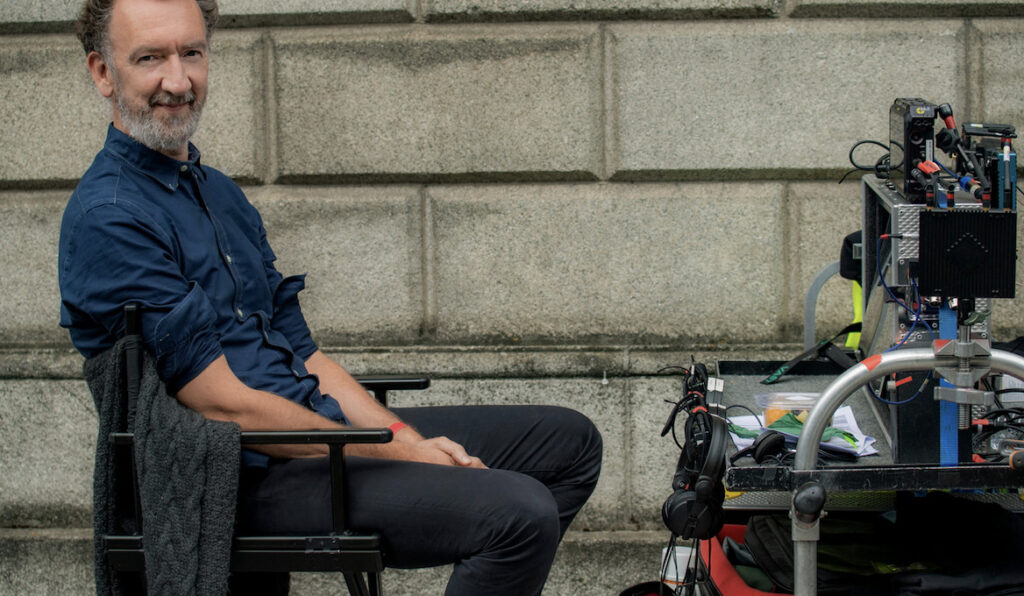
Check out more of Nobuhiro’s articles.
Here’s the trailer of the film.

